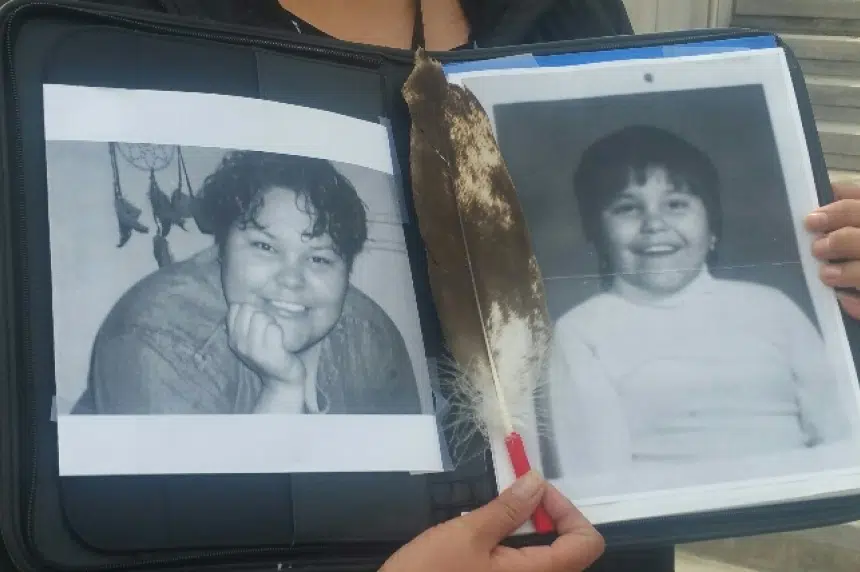An inquest into the death of a 35-year-old woman at the Saskatoon Regional Psychiatric Centre (RPC) was postponed on Monday after a massive collection of new documents was presented to the coroner.
Kinew James died in 2013 after suffering an apparent heart attack in her cell. In the wake of her death, there were accusations guards ignored her cries for help and muted the call button in her cell.
James was originally incarcerated for manslaughter. Her sentence was extended several times due to convictions for incidents that occured while she was imprisoned. All told, her original six-year sentence eventually became one of just over 15 years.
The inquest heard James suffered from mental health issues as well as diabetes.
Monday’s inquest was set up to look into the events immediately surrounding the day James died. Court heard the Corrections Service of Canada (CSC) provided a disclosure package of documents covering the year leading up to James’ death.
Josephine de Whyttel, a lawyer for James’ mother, and Gillian Gough, a lawyer for the Elizabeth Fry Society (EFry) argued this wasn’t enough.
Gough presented a package made up largely of CSC documents the society obtained while fighting for James’ release in 2011. Containing some 8,000 files, some of the documents dated back as far as 1998.
Gough said it was important to look at how various factors from James’ incarceration may have contributed to her death. For instance, Gough noted James was transferred between facilities some 30 times and argued this could have affected the continuity of her health care. Gough also said James had been in and out of the RPC 13 times over the years.
Throughout Gough’s presentation, inquest coroner Timothy Hawryluk repeatedly questioned the relevance of events from many years before James’ death. He noted the role of an inquest is limited by law, and isn’t the same as full independent inquiry.
De Whyttel made a motion for the coroner to expand the scope of the inquest. She said it was important for the new information to be considered as it would help the family get at the truth behind James’ death and would better inform the public about what happened. She said it was also vital for the new documents and potential new witnesses that could arise from them to inform the jury’s recommendations at the end of the inquest.
After expressing disappointment at having proceedings derailed on the first day, Hawryluk said he wasn’t comfortable ruling on the scope of the inquest until he’d had time to review the new documents. He adjourned the inquest indefinitely, suggesting it was unlikely they’d be able to resume until the fall at the earliest, and possibly not until early 2017.
Brother speaks out as inquest delayed
Cecil James, Kinew’s brother, said the family was glad there would be a pause to consider the new information.
Cecil said he has had trouble accessing even the original disclosure that was provided. His family lives in Winnipeg, and he had to go to Regina to look the disclosure over in the coroner’s office there. He said he made the trip last Wednesday and was troubled after even a quick examination of those documents, not to mention the thousands of new ones presented Monday.
He said one document detailed a time where guards used force on his sister.
“They went to the cell door at, let’s say, five mintues after (the hour). By nine minutes after, they’re already in the cell with the use of force. So that’s a pretty damn good response time. Now if they had that type of response time when my sister went into her medical emergency, we wouldn’t be here. My sister would be at home with us,” he said, alleging it took RPC staff as long as 27 minutes to get to his sister the day she died.
Cecil said he wants the inquest to delve into his sister’s long incarceration, particularly her stays in the RPC. He said he worries what effect his sister’s disciplinary issues had on how she was treated.
“There are pre-established relationships there. And to say that that had no effect on response times or that — it’s B.S.,” he said.
Cecil said he hopes the inquest will lead to recommendations that might spare another family a loss.
“(Kinew) was loved. She loved her family. She had a son. She had a mother. She had brothers and sisters,” he said.











